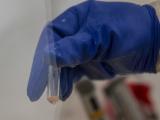Nov 6, 2006 (CIDRAP News) – VaxGen Inc., which is developing a new anthrax vaccine for the US civilian stockpile, announced last week it was postponing the latest clinical trial because of potential problems with the vaccine's shelf life.
In a Nov 3 press release, the Brisbane, Calif., company said the Food and Drug Administration (FDA) ordered the delay because it was concerned about a possible decline in the vaccine's potency during the immunization phase of the phase 2 clinical trial, which could cloud the study results.
"The notification is not related to any adverse event or preclinical finding related to the vaccine," VaxGen said in its press release.
The delay prompted the US Department of Health and Human Services (HHS) to issue VaxGen a "cure notice," which says HHS may cancel the vaccine contract if the company doesn't solve the problem promptly, the firm said in a Nov 4 news release.
The company said it would meet with the FDA as soon as possible to discuss how to satisfy the agency's requirements so the trial can proceed.
In 2004, HHS awarded VaxGen an $877.5 million contract, the first awarded under Project BioShield, to develop an anthrax vaccine for the civilian stockpile. The goal of Project BioShield is to develop medical defenses against chemical, biological, and radiological weapons. The contract was to produce 75 million doses, enough to vaccinate 25 million people.
The VaxGen anthrax vaccine is intended to replace Anthrax Vaccine Adsorbed (AVA), an older, whole-microbe anthrax vaccine used primarily by the US military. The older vaccine, controversial because of reported side effects, requires six doses over 18 months, whereas the VaxGen anthrax vaccine is expected to require three doses. The active ingredient in the VaxGen vaccine is a recombinant form of an anthrax protein called protective antigen (rPA).
The delay of the clinical trial is the second major setback for VaxGen this year. In May the company announced that the delivery of its vaccine would be delayed at least a year beyond the original target date of November 2006.
In March, the Washington Post reported that a human trial of VaxGen's vaccine revealed problems with its potency, and the company said the vaccine lost strength within a few months. At the time, VaxGen said rPA reacted with an aluminum hydroxide adjuvant (immune-boosting substance), but the company believed it had found a solution after experimenting with different formulations.
Also in May, the Government Accountability Office issued a report that said the government's contract with VaxGen was too rigid and might discourage other biotechnology companies from pursuing Project BioShield contracts. Developing new vaccines is expensive, difficult, and often fraught with testing and production delays.
In late September HHS held a workshop to hear the concerns of biotechnology firms, academic institutions, and the medical community regarding the BioShield program. Also, legislation has been introduced in Congress to help companies that are developing BioShield products more easily clear financial and regulatory hurdles.
See also:
May 11 CIDRAP News story "New anthrax vaccine for US stockpile delayed"
http://www.cidrap.umn.edu/cidrap/content/bt/anthrax/news/may1106anthrax.html


















